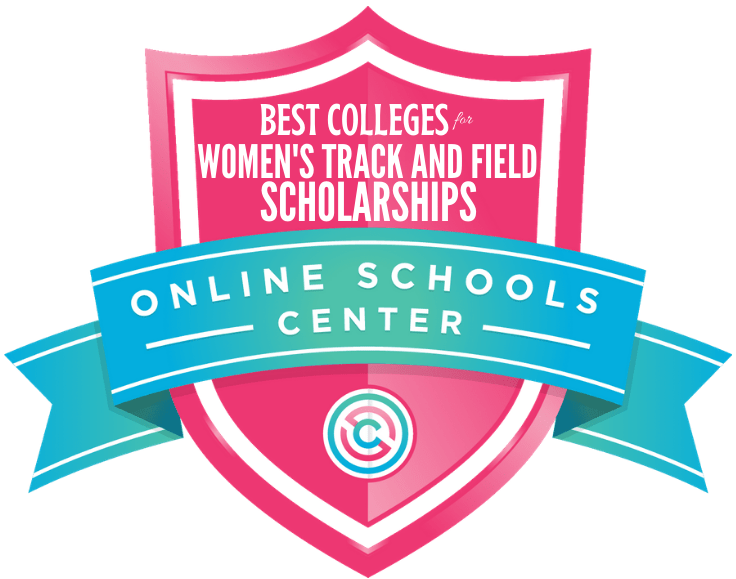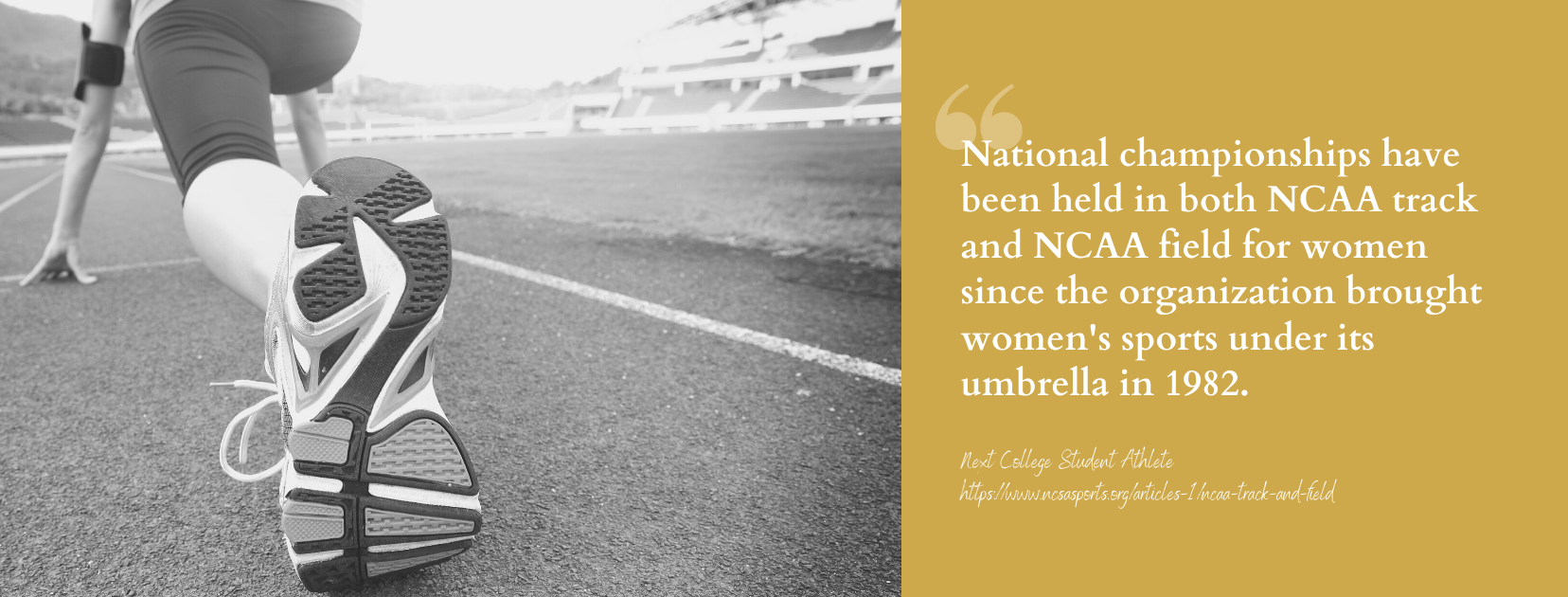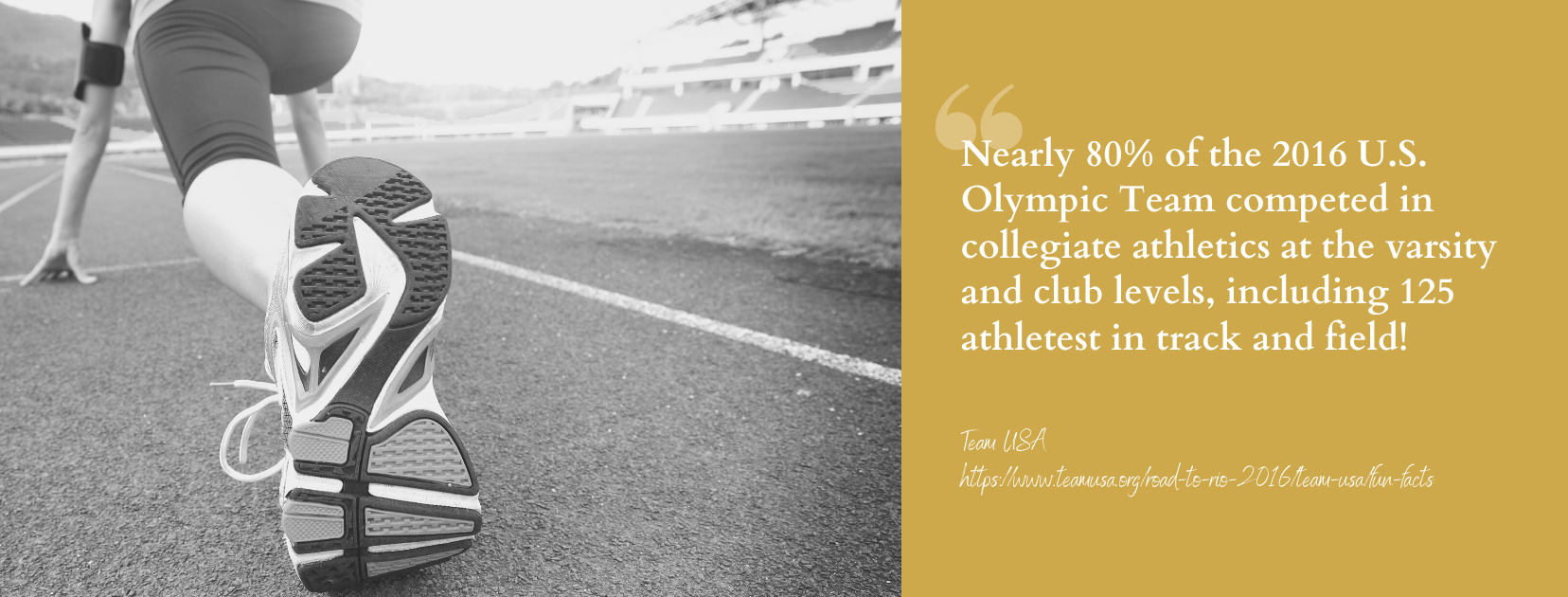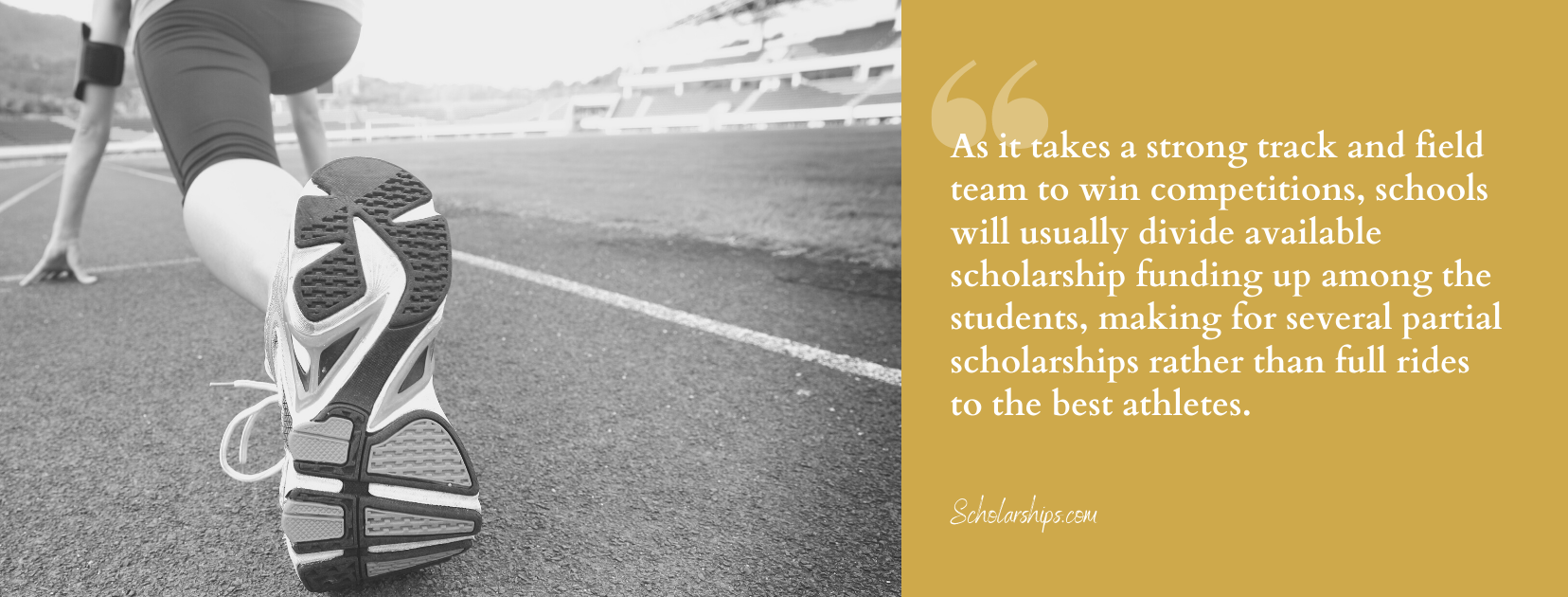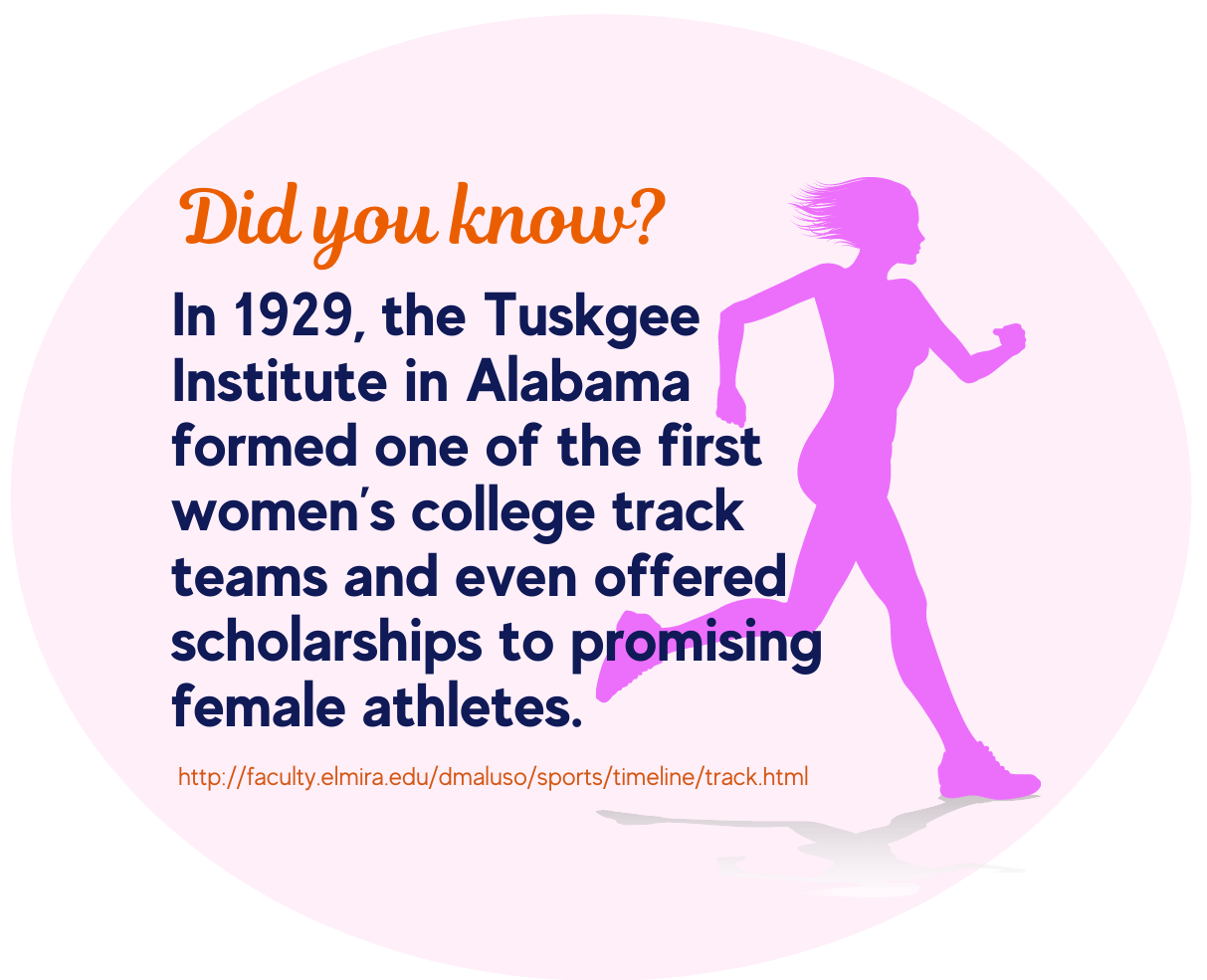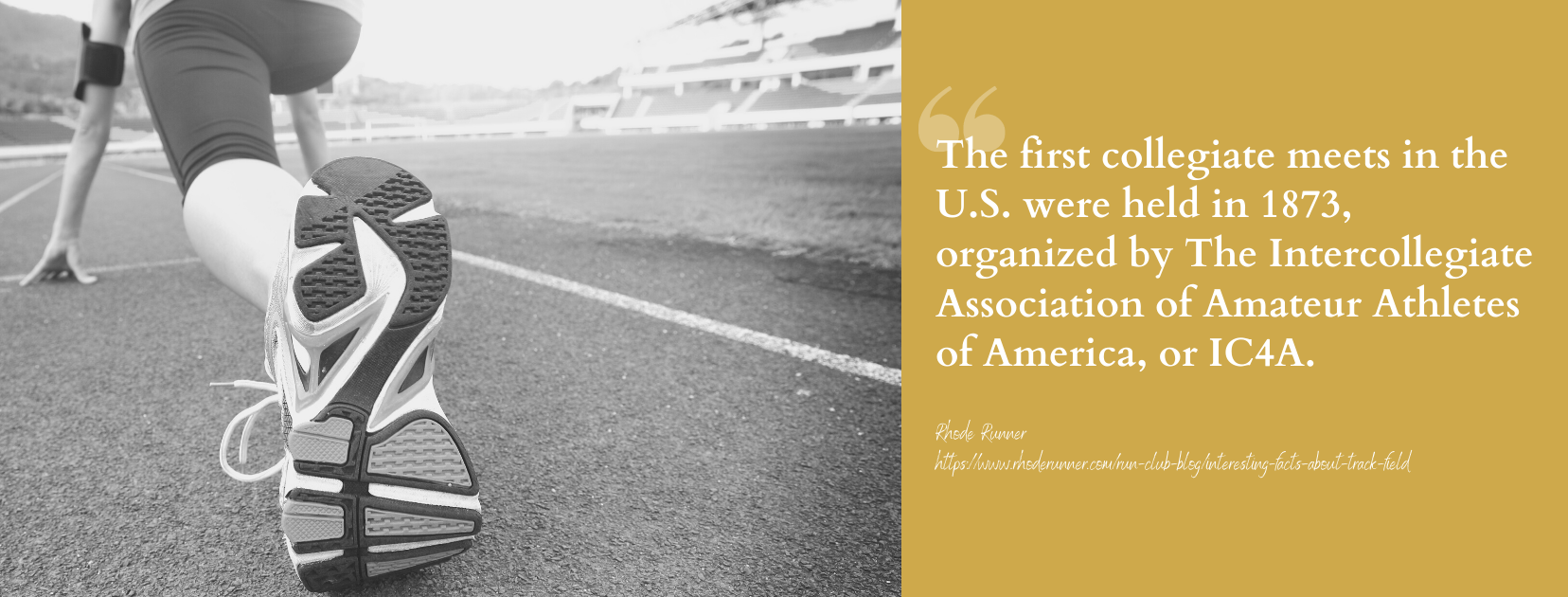Did you know that the first modern college track competition was held in 1864 in England? Oxford and Cambridge fielded their best track athletes, and the match ended up in a tie. Of course, the track and field traditions have their origins in prehistoric times since running, jumping, and throwing were natural human movements.
Nowadays, women’s track and field athletes shine on the college level just as much as their male counterparts. Sydney McLaughlin, Kay Gill, and Delaney Smith are just a few of the brightest stars, and, soon, you may well be one too!
While college is expensive, its costs can be significantly reduced with an athletic scholarship based on your excellent track and field ability. You will find that Division I and Division II schools in the NCAA offer athletic scholarships to their student-athletes. But Ivy League schools in Division I don’t offer athletic scholarships per se – instead, they offer a combination of academic scholarships, financial aid, and grants.
The number of scholarships allowed under NCAA rules differs depending on the division level, as detailed below: (Note that the number refer to the scholarship limit for every school for its women’s track and field team only)
- Division I – 18 scholarships
- Division II – 12.6 scholarships
- NAIA – 12 scholarships
Most track scholarships are partial rides, which means the scholarship will only cover a portion of the cost of attendance or some but not all of the cost of attendance items. Colleges and universities can provide full-ride scholarships to the best athletes, a privilege allowed under NCAA rules for long as the scholarship limit is followed.
There has also been a loosening of the regulations regarding academic scholarships and need-based financial aid not related to athletic ability. The NCAA D1 Council ruled that starting August 1, 2020, the academic scholarships and need-based financial aid provided to track and field athletes will not be counted against the maximum athletic scholarship limit. Before this decision, student-athletes were required to meet stringent criteria for any additional financial aid not counted against the entire program’s limit.
The maximum athletic scholarship ceiling will still be in effect. But student-athletes will now be allowed to secure as much academic scholarships and need-based financial aid they qualify for. This means that student-athletes will have more breathing room, a welcome respite for families who have experienced dips in their income due to the widespread unemployment.
But getting into a track and field program with excellent athletic scholarship opportunities isn’t a walk in the park! You have to start scouting the best schools as early as possible, perhaps in your junior year in high school. You should also prepare your academic and athletic résumé so recruiters will take notice.
Here are a few steps to get you started on the right foot.
- Understand the rigors of each division level first. While the NCAA Division I schools are the most attractive, their athletic programs are the most demanding, both in academics and athletics. Their recruitment and selection process can be brutal, too, resulting in only the elite athletes getting into the program – and staying there.
- Research the schools you’re interested in. You should consider the schools’ academic and athletic reputation and their location, scholarship programs, and culture. You have to consider that you may well spend the next four years of life as a, say, Florida Gator so being a good fit is necessary.
- Build your résumé and make yourself look good, if not a great prospect for track and field programs. Ideally, you should include a skills video, academic transcripts, athletic statistics, and ACT/SAT scores. You must look over it a few times until you’re satisfied that it will catch the coaches’ attention.
- Communicate with college coaches, usually through emails. Put yourself in the coaches’ shoes and find creative ways to stand out from the crowd. Be sure to provide a link to your skills video, place an appropriate subject line on the email, and make individualized email – a one-size-fits-all letter signifies laziness, among other negative traits.
In many ways, getting into a great track and field program in college is a race in itself! You have to be the best you can be and run the race like a true champion – with passion, preparedness, and perseverance.
Check out these page-jumps to get more information about the 15 Best Colleges for Women’s Track and Field Scholarships:
- University of Southern California
- University of Oregon
- University of Arkansas at Little Rock
- University of Florida
- University of Georgia
- Texas A&M University
- The University of Texas at Austin
- University of Notre Dame
- Baylor University
- Purdue University
- University of Alabama
- Virginia Tech
- Auburn University
- University of Missouri – Columbia
- University of Kansas
University of Southern California
The USC’s women’s track program is among the nation’s finest not only because of its numerous athletic achievements but also because of its athletes’ stellar academic performance. The Trojans have one NCAA title (2001) and one Mountain Pacific Sports Federation Indoor Track & Field title (2014) aside from its NCAA finals appearances.
USC offers its track athletes with four-year or five-year scholarships through the Athletic Department. The four-year cap is intended to encourage student-athletes to finish their bachelor’s degree within four years, the standard duration for a baccalaureate program. But student-athletes can also avail of an extra year of scholarship, the fifth year, upon the Athletic Director and other concerned officials’ discretion.
Note: The NCAA has a five-year cap on student-athletes’ eligibility for competitions.
The Athletic Department will only provide scholarship funds for a maximum of 128 units of credit, as required in most majors. It is also the same support provided to USC students receiving full-tuition Trustee Scholarships, the best academic students.
A full-ride athletic scholarship only covers tuition, compulsory fees, required and recommended textbooks, standard room and board, transportation, and miscellaneous expenses. The items not covered by an athletic scholarship, both full and partial, include tuition refund insurance, health insurance, late fees, damage charges, finance charges, and interim housing charges. Be sure to understand your scholarship agreement terms.
Call the USC Compliance Office at (213) 740-6727 for more information about athletic scholarships or visit the USC Financial Aid page.
University of Oregon
The Ducks track and field athletes compete in both women’s indoor and outdoor events. The team has won several championships in both events, too, with their most successful period being from 2010 to 2017.
The University of Oregon offers athletic scholarships, also called grants-in-aid, to its track student-athletes. Like its Division I counterparts, it may offer full-ride scholarships to certain team members, but the norm is partial scholarships to multiple athletes. The university follows the NCAA rules and regulations about athletic scholarships, including scholarship caps, eligibility, and academic standards.
Since the NCAA already allows track athletes to receive non-athletic scholarships and aids, here are a few scholarship opportunities to look into. These can bridge the gap between a partial scholarship and the total cost of attendance and personal living expenses if the scholarship manager allows it.
- The Stamps Scholarship is open to students with a 3.85 GPA or higher, and recipients are chosen based on their academic record and extracurricular involvement.
- The Presidential Scholarship also accepts applications from students with a 3.85 GPA or higher and with an extracurricular record. The application is due on February 1 with all materials in the Office of Admissions by February 15.
- The Diversity Excellence Scholarship recipients are chosen based on their academic and extracurricular record, financial need, and contribution to the university’s diversity mission.
You may contact the Grant-in-Aid Coordinator in the Compliance Office at (541) 346-4499. You may also contact the track head coach via the sports contacts and questionnaires page. For general questions about non-athletic scholarships, you can contact the Office of Student Financial Aid and Scholarships at (541) 346-4481.
University of Arkansas at Little Rock
The Little Trojans track team members are usually on athletic scholarships because of their academic and athletic achievements. Indeed, the scholarship funds are welcome because the University of Arkansas at Little Rock’s average tuition and fees for 2020-2021 are fairly expensive.
For in-state undergraduate students, the average tuition and fees, room and board, and books and supplies are $9,166 per semester or $18,333 per year. The university provides athletic scholarships for its student-athletes to decrease their attendance cost and, thus, motivate them to do their best on and off the track.
You may contact the Athletics Department for clarification and information about athletic scholarships. Hunter Yurachek, the Director of Athletics, can be reached at 479-575-7641 or [email protected]. For general questions about scholarships, you may contact the university at 501-916-3035 or send an email to [email protected].
There are also several endowed athletic scholarships that female track athletes can look into.
- Arlen M. Crass Athletic Scholarship considered the financial need and academic accomplishments in choosing a recipient athlete.
- Jack Kinnaman Family Athletic Endowed Scholarship gives preference to a fifth-year student-athlete.
- Ledbetter Hatchett Athletic Scholarship gives preference to minority athletes.
- Morris and Dorothy Beebe Endowed Athletic Scholarship is awarded to an athlete with a competitive spirit, strong teamwork ethics, and excellent athletic and academic accomplishments.
- Sam Laser Endowed Athletic Scholarship is awarded to a full-time athlete with a demonstrated competitive spirit, financial need, and academic and athletic accomplishments.
Ask the staff at the financial aid office about scholarship stacking rules and regulations.
University of Florida
The Gators women’s track program has six SEC indoor titles and five SEC outdoor championships. Now that’s enough reason to become part of the team while also getting a quality college education—with an athletic scholarship to boot!
The University of Florida offers track scholarships according to NCAA Division I rules and regulations. The University Athletic Association, Inc. (UAA), a non-profit corporation, oversees the scholarship program and the intercollegiate athletic programs. A board of directors runs this with the university’s Athletic Director as its leader; the Athletic Director also directly reports to the university president.
As such, the scholarship funds aren’t from university funds or state and federal funds. Instead, the money comes from UAA’s ticket revenues, media partnerships, and corporate sponsorships. It’s funded by private donors, too, through the Athletic Department’s fundraising arm, the Gator Boosters.
Are you interested in becoming a UAA athletic scholar? You can write to the organization at P. O. Box 14485, University of Florida, Gainesville, Florida 32604-2485, or call them at (352) 375-4683. You should be prepared with appropriate documentation and videos of your games for submission when required.
Student-athletes are also allowed to apply for other scholarship opportunities offered by the university and external opportunities. The university scholarships include Presidential Scholarships with amounts ranging from $5,000 to $10,000 per year and renewable every year for up to four years.
Out-of-state scholarships are also available, albeit limited in number and competitive by nature. These include the Alumni Scholarship $8,000 per year), Sunshine Scholarship (up to $16,000 per year), and Gator Nation Scholarship (up to $20,000 per year).
Look for other scholarship opportunities at this online search engine.
University of Georgia
The University of Georgia Athletic Association manages the scholarship program for student-athletes and awards approximately 600 scholarships. The women’s track program is included in the scholarship program. It is either full or partial, depending on the head coach’s and other concerned officials’ discretion.
Under the NCAA rules and regulations, an athletic scholarship only covers all or part of tuition and mandatory fees, required textbooks, and room and board, among others. More than $11 million in scholarships are disbursed every year, and private donations or endowments fund many of these. The eligibility requirements and coverage for each scholarship program are spelled out.
The Athletic Association awards the full tuition for both in-state and out-of-state students, although the amounts will differ. The funds used for scholarships are sourced from the Athletic Association’s revenues, particularly from ticket sales, corporate sponsorships, and media partnerships. The fund also comes from the generous donations made by alumni and friends of the university. No university, state, and federal funds are used.
While the Athletic Association follows the NCAA guidelines on athletic scholarships, it also exercises a certain level of independence in its allotment. For example, a student-athlete can receive a higher amount as book allowance and on-campus housing aid than what’s stated in the NCAA manual.
Get information and answers to questions by visiting the FAQs page. You may also contact the Athletic Department at (706) 542-9036 or call the track and field head coach (706-542-7915).
Texas A&M University
The Texas A&M University Department of Athletics awards the A&M-Texarkana Athletic Scholarships on an annual basis. Each applicant must meet the stringent academic and athletic requirements set by both the Department of Athletics and the NCAA Eligibility Center.
Applicants must meet the following athletic scholarship requirements:
- Must be accepted by the University Admissions Office
- Must meet NCAA eligibility requirements
- Must have at least a 2.0 cumulative GPA for an incoming freshman; 2.0 cumulative undergraduate GPA for a transfer student
- Must maintain at least 2.0 cumulative undergraduate GPA during the scholarship period as a requirement for renewal
- Must actively participate in the intercollegiate team
- Must meet the requirements set by the Director of Athletics and the Head Coach
You can contact Pat Henry, the head coach for the track and field program, at 979-845-9534 or visit the athletics staff directory page for other actions. You may also visit the TAMU-T Athletics page.
The university also has several athletic endowments that student-athletes in the track program may be eligible for. Each endowment has specific criteria, including stacking rules.
The H.M. & Rachel Lafferty Scholarship Endowment is specifically for female athletes and doesn’t have specific criteria. The Margaret Waters Harbison & Paul D. Harbison Endowment is open to all student-athletes, with the Athletic Director having complete discretion over the recipient’s choice. The Marj Bell Endowment for Women Athletes is open to student-athletes enrolled at the Department of Health and Physical Education. The Teressa “Doc” Braddock Endowment welcomes female athletes with good academic standing and demonstrated financial need.
Send an email to [email protected] for more information about endowed athletic scholarships.
The University of Texas at Austin
The Longhorns women’s track and field program’s achievements will intimidate inferior athletes! The program has 11 NCAA championships in indoor and outdoor events and a Women’s Cross-Country Championship title. Several Olympians whose careers started at the University of Texas, including Michelle Carter, Sanya Richard-Ross, and Moushami Robinson.
The Longhorns athletes are typically provided with athletic scholarships administered by the Athletics Department. Emphasis must be made that the Athletics Department doesn’t solicit, rely on, and distribute public funds for its athletic scholarships. The athletic scholarship program is a self-funded enterprise with most of its funds from ticket sales, private donations, and media sponsorships.
When the recipient student-athletes have been identified, and their papers are submitted, the Athletics Department then transfers the necessary funds to the academic departments. The funds will cover the scholarship costs as specified on each student-athlete’s scholarship agreement.
You may email One Stop, the university’s one-stop portal for students, at [email protected], or call them at (512) 232-6988 for more information about financial aid and scholarships. You can also contact Chris Del Conte, the Director of Athletics, at 512-471-5757 or get in touch with Edrick Floreal, the head coach for the combined men’s and women’s track field program.
Track athletes at UT-Austin are also eligible to apply for merit-based and need-based scholarships, as allowed by the NCAA under certain conditions. There are scholarships for incoming first-year students, transfer students, and continuing students, most of which don’t require a separate application. Be sure to ask the department where you’re enrolled about departmental scholarships, too.
University of Notre Dame
The University of Notre Dame considers the allotment of scholarships in all 26 of its varsity sports a top priority. As such, the university strives to provide its student-athletes with a high-quality intercollegiate athletics experience. This includes providing student-athletes with access to athletic scholarships.
The Fighting Irish women’s track and field members are recipients of the university’s athletic-related financial aid. In general, it covers all or some of the cost of attendance items, including tuition and fees, books and supplies, room and board, personal expenses, and transportation.
A full athletics scholarship will cover the entire amount of these items. But this isn’t the norm. The Athletics Department has to allocate the scholarships according to the team’s best interests. Partial athletic scholarships are provided with each student-athlete being informed of her specific coverage, either in percentage or dollar terms.
The athletic aid is directly credited to the concerned student-athletes student account so that the funds can be applied toward the allowed items, such as tuition, fees, and room and board. The funds are evenly divided between each semester as the athletic aid is for one academic year. If there’s an excess amount, the student-athlete may receive it as a refund.
Also, student-athletes awarded a full scholarship will receive a monthly meal and housing stipend from September to May of the academic year. The Athletics Business Office disburses the stipend.
Contact Matt Sparks, the Hatherly-Piane Director of Track & Field and Cross Country, at 631-1219 or send him an email to [email protected] for more information.
Baylor University
The Baylor Bears women’s track and field athletes receive athletic scholarships according to NCAA guidelines, including the number of scholarships limit and the academic and athletic eligibility requirements. Interested high school athletes should review the NCAA guidelines to understand Baylor University’s athletic scholarship program.
Like its Division I counterparts, the Baylor Athletics Department gives head coaches the discretion to identify the scholarship recipients and recommend them to the Director of Athletics for approval. You can contact Baylor Athletics at (254) 710-1234 and ask for the track and field head coach’s name and contact details.
Since track and field athletes can now apply for non-athletic aid without affecting their team’s overall scholarship limit, prospective students should also consider these scholarship opportunities. (The financial aid is welcome since the cost of attendance for AY 2020-2021 is over $63,000, including tuition, fees, and room and board.)
First, academic scholarships are merit-based aid, wherein students don’t have to take additional application steps. Every admitted student is considered for academic scholarships, and recipients are selected based on the admission application’s information.
Second, financial aid applicants must submit their FAFSA and CSS Profile, open on October 1 for submissions. Don’t hesitate because over 90% of Baylor students are financial aid recipients! The FAFSA is also essential in determining your eligibility for educational loans, grants, and federal work-study programs.
Purdue University
The Boilermakers women’s track and field team are four-time Big Ten champions and known for their grit and gumption on and off the track. Every student-athlete has the opportunity to apply and receive scholarships that will reduce their out-of-pocket payments for their cost of attendance. For AY 2020-2021, an in-state student may spend at least $22,782, while an out-of-state student may spend $41,584 for tuition, room and board, and other education-related expenses.
You can get more information about athletic scholarships by contacting the Athletics Department. You may contact the Athletics Director, Mike Bobinski, by sending an email to [email protected] or calling 494-3189.
Purdue University also welcomes scholarship applications from student-athletes. You can apply to as many scholarship programs as you’re eligible but keep in mind that it will mean submitting multiple documents.
These are a few of the scholarship programs that you may want to consider:
- Purdue Black Alumni Organization Roger Blalock Scholarship ($1,0oo award; Must have at least 2.80 GPA and must be of Hispanic or African descent)
- Class of 1937 Scholarship (Award amount varies; Must have at least 2.0 GPA and a domestic student; Must demonstrate leadership and ability)
- Mortar Board Fellowship Awards ($2,500 award; Must be planning to enroll in a graduate degree program after graduation; Open only to students who will graduate in May, August, or December)
Check out the athletic awards offered by the NCAA and Big Ten, too, such as the NCAA Ethnic Minority & Women’s Enhancement Programs’ Postgraduate Scholarship, NCAA Degree Completion Award, and Big Ten Postgraduate Scholarship.
University of Alabama
The University of Alabama Athletics Department is admired for its commitment to full institutional control while staying compliant with the NCAA and SEC rules. Every official, coach, staff, student-athletes, and other stakeholders take on roles and responsibilities to ensure that they adhere to this principle, particularly concerning athletic scholarships.
Student-athletes are provided with comprehensive academic services and athletic support, aside from athletic-related financial aid. First-year students and junior college transferees must attend study hall sessions every weekday night. Every student-athlete’s academic needs and performance are carefully evaluated so that appropriate support can be made, as is the case for her athletic needs and performance.
The CASS staff, the undergraduate academic divisions, and the Athletic Department work together to ensure that student-athletes are hitting their academic and athletic goals. The Office of Undergraduate Admissions, the undergraduate colleges and schools, and the National Alumni Association also work together to provide a wide range of scholarship opportunities.
Contact Alabama Athletics Compliance at 205-348-3615 or email them at [email protected] for questions about athletic scholarships.
Virginia Tech
The head coach of Virginia Tech’s women’s track and field program identifies the recipients of athletic scholarships, as is the case with other Division I schools. But the head coach is also allowed to give scholarships to the people behind the scenes or the non-competitive participants like the trainers and videographers. In student-athletes, the main recipients of athletic grants-in-aid are chosen based on their academic eligibility and athletic ability.
The Department of Athletics approves the head coach’s recommendations and sends the list to the Office of University Scholarships and Financial Aid. The latter then awards the scholarships based on said recommendation and sends out emails to the recipients detailing their scholarship terms. The Athletic Scholarship Award Letter also includes NCAA links detailing rules and regulations about athletic scholarships.
Student-athletes may also be eligible for other types of financial aid. You must complete the FAFSA process if you want to be eligible for financial aid, aside from an athletic scholarship. The FAFSA application is also necessary for Stafford loans, Pell Grants, and Parent PLUS Loans.
Ask the Office of University Scholarships and Financial Aid or the Office of Undergraduate Admissions for more information.
Auburn University
The Auburn University’s Department of Athletics considers faithful compliance to the NCAA and SEC’s letter and spirit to be of utmost importance in its operations. The university takes full responsibility for the actions and omissions of its coaches, faculty and staff, and student-athletes, among others, as these relate to athletics. As such, student-athletes and their parents or guardians must be fully aware of the NCAA and SEC rules and regulations.
Every student-athlete on the women’s track and field program also receives comprehensive student services to encourage the best academic and athletic performance. These include academic counseling with an academic athletics counselor who provides direction and guidance; access to the Tiger Tutor program that provides ongoing study skills development and academic support; and access to the Study Table program.
There are also plenty of academic and athletic scholarships offered by the university, including:
- SEC H. Boyd McWhorter Postgraduate Scholarship ($20,000 award for one female and $10,000 award for 13 females)
- Brad Davis SEC Community Service Postgraduate Scholarship ($15,000 award for one female and $7,500 award for 13 females)
- NCAA Ethnic Minority and Women’s Enhancement Postgraduate Scholarship for Careers in Athletics ($10,000 award for 13 female college graduates and $10,000 award to 13 individuals belonging to ethnic minorities)
Complete this contact form to communicate with Auburn University Athletics.
University of Missouri – Columbia
The cost of attendance at the University of Missouri is reasonable – $9,972 for an in-state student, $27,042 for an out-of-state student. But these amounts can still be burdensome for students and their parents. This is where the athletic scholarships offered by the university comes to the rescue.
The women’s track and field student-athletes are among the recipients of these athletic grants-in-aid, which are typically decided on by the head coach with the approval of the Director of Athletics. Keep in mind that the head coach and his staff typically initiate the initial contact with qualified high school recruits. But you can contact Brett Halter, the head coach for track and field, at 882-9323 or send an email to [email protected].
M.U. also offers automatic scholarships to incoming first-year students who graduated in the prior semester from high school. Students must be enrolled full-time or 12 credit hours to be considered for these scholarships; at least six credit hours should be spent at the Columbia campus. The university only approves scholarships that will cover tuition and fees, among others, but not more than the total cost of attendance, as determined by the university.
University of Kansas
The University of Kansas awards athletic scholarships according to its university policy and the rules and regulations implemented by the NCAA and the Big Ten Conference. The Senior Associate Athletic Director for Compliance sets the policies and practices related to athletic financial aid provided to Kansas Athletics.
The Director of Athletics has the responsibility of scholarship fund allocation, particularly in determining the specific number of athletic grants-in-aid. The head coach for every athletic program, including the track and field program, recommends the recipients and amounts. The terms and conditions for each student-athlete’s scholarship agreement are affected by the NCAA limitations.
Note that Kansas Athletics provides the funds for the maximum number allowed for the women’s track and field program and the cross-country program. Kansas Athletics may also provide funding for study abroad programs if and when these are necessary for degree completion.
Write to Kansas Athletics at [email protected] or call them at (785) 864-8200 for more information.
Now that you know the best colleges for women’s track and field scholarships, you should start researching these schools!
